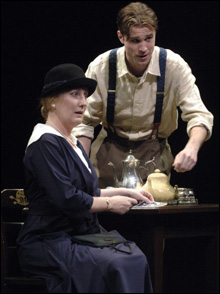Enchanted April , Samurai 7.0: Under Construction
By CAROLYN CLAY | June 14, 2006

ENCHANTED APRIL: Emotional dead wood blooming in spite of itself.
|
What one most remembers from the 1992 Mike Newell film Enchanted April is the beauty duel between Polly Walker and the scenery. Matthew Barber’s stage adaptation of Elizabeth van Arnim’s 1922 novel, which was nominated for a 2003 Tony Award, can’t hope to compete with the film in serving up the “wisteria and sunshine” that draw four sensually deprived Englishwomen to Italy in the devastating wake of World War I. But it does a better job of capturing the book’s post-war melancholy, which thaws along with class distinctions in a rented castle by the sea. And at Shakespeare & Company in Lenox, where Normi Noël’s production continues in repertory through September 2, a sensitive and competent ensemble turns on both the sadness and the heat as four unlikely “sisters” discover their inner rejuvenators. Even Rachel Gordon’s set blooms, sprouting garlands and urns full of flowers during intermission.The play begins to the tune of English rain, with Diane Prusha’s slightly dotty, sensibly shod Lotty telling (for the first time) the book’s story of a man who plants his walking stick on a new property to mark the place where he intends to plant an acacia, then returning in spring to find that the stick itself has taken root and sprouted — and that is it indeed an acacia. The play is a similar fable, in which emotional dead wood blooms in spite of itself. The charming story, however, is slow getting off the ground, with act one taking the form of nine short scenes during which the meek but unstoppable Lotty, inspired by a newspaper ad for the Italian castle to let (and by her own prescient visions), bulldozes Ladies’ Club acquaintance Rose Arnott into signing on, then rounds up languid flapper Lady Caroline Bramble and dictatorial widow Mrs. Graves to complete the party. And, of course, we meet the husbands who are making Lotty and Rose unhappy: condescending lawyer Mellersh Wilton and party boy Frederick Arnott, who distresses his religious wife by writing salacious biographies under a pen name. Although well sketched and amusing, the act seems fragmented and the English dreariness in which it unfolds all too real.
Act two brings not only warmth but cohesiveness to the material — along with combustible Italian retainer Costanza, played by Rachel Siegel as an oddly young and blonde but credibly unilingual spitfire who is also a comfort. Each of the women at San Salvatore Castle is nursing a heartache, Rose for her errant husband and the loss of a child, Lotty for her disappointing marriage, Lady Caroline (as she graciously permits herself to be called, omitting her sir name but not her title) for a love whose loss no amount of gin, jazz, and modernity can assuage, and the literarily connected Mrs. Graves for the less ossified life her rigidity has kept her from living. (Barber changes the names of some of Arnim’s characters.) But eventually all are pulled into the maelstrom of Lotty’s ditzy determination to kiss “before” goodbye and forge an “after” into which to plunge headlong. And this being 1922, when women were arguably defined by men, the guys, including the jovial castle owner to charm Mrs. Graves and rekindle Lady Caroline, must show up to smell the sun, sex, and flora.
 Related
Related:
Let’s get physical, Et tu Brute?, So-so Shakespeare, More 
- Let’s get physical
Shakespeare’s super-dainty Kates become cannoli in The Taming of the Shrew on Boston Common.
- Et tu Brute?
"The whole theatrical event is sort of . . . a much more mysterious one."
- So-so Shakespeare
If Shakespeare had written no tragedies or histories of note, his comedies would still delight us 400 years later because of their timeless wordplay, exuberant sense of fun, and still-valid psychological underpinnings.
- Horribly nice
Talk about a bad rap.
- Mucho Ado
Much Ado About Nothing is hardly about inconsequential things. It’s about life, love, and the apparent loss of each through malevolent treachery.
- More Bard, another park
Just as fiddleheads and lilacs sprung early this year, so have the urban-pastoral pleasures of al fresco Shakespeare.
- It’s a man’s world
It’s hardly Shakespeare’s most frequently produced work, but in the Bard’s early career, Titus Andronicus was one of his most popular plays.
- Brave new world
Regardless of what’s in her name, biographies of Ms. Hathaway are scarcer than hens’ teeth, and no wonder: we know even less about her than we do about her husband.
- Out on a limb
Actors’ Shakespeare Project handles Shakespeare’s biggest bloodbath without turning on a single spigot.
- A bad Shake
Thank goodness for bad plays.
- Royal fun
As You Like It accomplishes what every production of a Shakespeare comedy tries to do.
- Less

 Topics
Topics:
Theater
, Entertainment, Tod Randolph, Performing Arts, More  , Entertainment, Tod Randolph, Performing Arts, William Shakespeare, Bowdoin College, Emerson College, Theater, Maggie Smith, Boston Center for the Arts, Akira Kurosawa, Less
, Entertainment, Tod Randolph, Performing Arts, William Shakespeare, Bowdoin College, Emerson College, Theater, Maggie Smith, Boston Center for the Arts, Akira Kurosawa, Less 